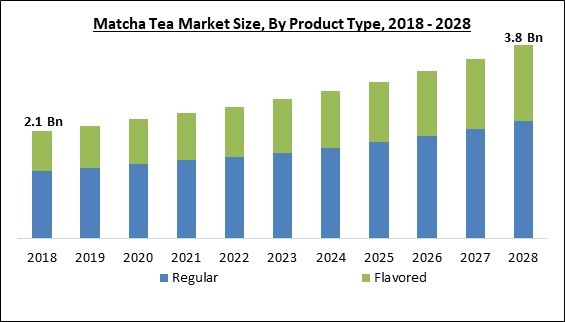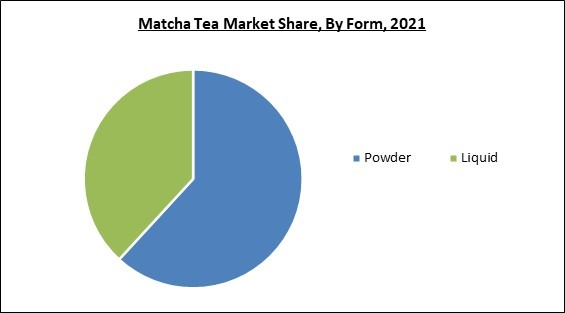The Global Matcha Tea Market size is expected to reach $3.8 billion by 2028, rising at a market growth of 6.6% CAGR during the forecast period.
Matcha tea is a form of green tea produced by harvesting and crushing young tea leaves into a beautiful green powder. Available in powdered and liquid form, it is a kind of Japanese green tea. This tea has a taste that is mellow and pleasant. It is derived from the Camellia sinensis plant, gathered in China and Japan due to its climate and soil. The expansion of the matcha tea market is propelled by an increase in customer interest in adopting a healthy lifestyle and the numerous health advantages associated with matcha tea.
For instance, matcha tea aids in weight loss, alleviate headaches and physical discomfort, lowers cholesterol levels, and reduces the risk of heart attacks. Also, matcha increases metabolism, burns calories, reduces cholesterol and blood sugar, and enhances mood due to its high antioxidant content. The processes of synthesis and accumulation of physiologically active compounds, including theanine, caffeine, chlorophyll, and other catechins, are accelerated when plants are shaded throughout their development phase.
The most potent form of catechins in green tea is matcha, which includes epicatechin, epicatechin-3-gallate, epigallocatechin, and epigallocatechin-3-gallate. It is considered the highest-grade tea due to its particular chemical makeup and prized flavor, which set it apart from other tea drinks. Its health-promoting properties are attributed to its high antioxidant and anti-inflammatory chemical content.
According to research, the high catechin content in tea beverages is responsible for their high antioxidant capacity. Catechins are a type of phenolic molecule with health-promoting qualities. The health benefits of green tea are attributable to the presence of natural antioxidants known as polyphenols, which comprise up to 30% of green tea's dry weight.
The market research report covers the analysis of key stake holders of the market. Key companies profiled in the report include Nestle S.A., The Hain Celestial Group, Inc., Ito En, Ltd., Tata Consumer Products Limited (Tata Group), The AOI Tea Company, Ikeda Tea World, Marukyu Koyamaen Co., Ltd., Encha Life LLC, Mizuba Tea Co. and Green Foods Corp.
Matcha tea is a form of green tea produced by harvesting and crushing young tea leaves into a beautiful green powder. Available in powdered and liquid form, it is a kind of Japanese green tea. This tea has a taste that is mellow and pleasant. It is derived from the Camellia sinensis plant, gathered in China and Japan due to its climate and soil. The expansion of the matcha tea market is propelled by an increase in customer interest in adopting a healthy lifestyle and the numerous health advantages associated with matcha tea.
For instance, matcha tea aids in weight loss, alleviate headaches and physical discomfort, lowers cholesterol levels, and reduces the risk of heart attacks. Also, matcha increases metabolism, burns calories, reduces cholesterol and blood sugar, and enhances mood due to its high antioxidant content. The processes of synthesis and accumulation of physiologically active compounds, including theanine, caffeine, chlorophyll, and other catechins, are accelerated when plants are shaded throughout their development phase.
The most potent form of catechins in green tea is matcha, which includes epicatechin, epicatechin-3-gallate, epigallocatechin, and epigallocatechin-3-gallate. It is considered the highest-grade tea due to its particular chemical makeup and prized flavor, which set it apart from other tea drinks. Its health-promoting properties are attributed to its high antioxidant and anti-inflammatory chemical content.
According to research, the high catechin content in tea beverages is responsible for their high antioxidant capacity. Catechins are a type of phenolic molecule with health-promoting qualities. The health benefits of green tea are attributable to the presence of natural antioxidants known as polyphenols, which comprise up to 30% of green tea's dry weight.
COVID-19 Impact Analysis
During and after the pandemic, the demand for matcha tea increased due to a growing consumer awareness of the importance of health and fitness and a greater understanding of its benefits. The re-establishment of manufacturing and supply chain infrastructure has led to an increase in market demand and supply. In addition, a growing number of product advancements that provide customers with powerful antioxidants and vitamins will further stimulate market demand.Market Growth Factors
The rising health-conscious consumers raises the demand for healthy food and beverages
Matcha is utilized in several beverages and desserts, including lattes, frappés, waffles, green tea ice cream, cupcakes, and cookies. Nonetheless, demand is increasing for matcha tea and lattes as weight watchers, and health-conscious clients reduce their consumption of sweet goodies. The rising influence of social media, where fitness-based items are sold and promoted around the world, aids the revenue growth of the matcha tea market due to its associated health benefits and the increasing number health conscious consumers.The increasing utilization of matcha in organic skincare products
Matcha tea is used in balms, lotions, and cleansers due to the increasing demand for natural and organic skincare products. Matcha-infused skincare products are frequently lauded and sought after by influencers and skincare enthusiasts, respectively. As a result of its strong antioxidant content, matcha efficiently reduces inflammation and calms sensitive skin. The use of matcha powder in organic skin care products also adds to market growth.Market Restraining Factor
Wider availability of substitutes with the limited standards and research for matcha tea
White tea, oolong, and herbal tea are available as matcha alternatives. Several alternatives available on the market provide comparable health advantages to matcha tea and are allegedly priced competitively. Hence, customers may switch easily to these options due to their wider availability. Thus, a lack of research and standardization of matcha tea might force consumers to opt for the broadly available alternatives, which might hinder the market growth of matcha tea.Product Type Outlook
Based on product type, the matcha tea market is segmented into regular and flavored. The regular segment dominated the matcha tea market with maximum revenue share in 2021. This is because regular or pure matcha is used as a regular drinking tea or an ingredient in the food service, culinary, and cosmetic sectors. Increasing daily usage of wellness teas like matcha tea is promoting the demand for regular matcha tea due to its health advantages. In addition, the increase in demand for regular matcha tea from the food, cosmetics, and culinary industries to use it as a nutritious ingredient in their products, such as face cream, sweets, beverages, and cookies, is anticipated to present a growth opportunity and thereby boost the segment's growth.Form Outlook
On the basis of form, the matcha tea market is divided into powder and liquid. The liquid segment procured a substantial revenue share in the matcha tea market in 2021. This is because matcha liquid or ready-to-drink is sold in a prepared condition suitable for consumption. Ready-to-drink matcha tea, unlike matcha tea powder and brew-it-yourself, is available in bottles and may be consumed immediately after purchase. In the beverage sector, demand for ready-to-drink matcha tea is increasing rapidly since it is available in various flavors, may be chilled, and can be sweetened or unsweetened.Nature Outlook
By nature, the matcha tea market is classified into conventional and organic. The conventional segment witnessed the largest revenue share in the matcha tea market in 2021. This is owing to its broad availability in supermarkets, specialty stores, and convenience stores. Conventional matcha tea is grown using chemicals, herbicides, and fertilizers, which gives a huge product output. In addition, this area's product catalog is broader than the organic segment, which aids the segment's growth during the forecasted period.Distribution Channel Outlook
Based on the distribution channel, the matcha tea market is bifurcated into supermarket/hypermarket, specialty store, foodservice, online store and others. The online stores segment recorded a considerable growth rate in the matcha tea market in 2021. This is because of the accessibility of matcha tea and its perks, which include information on the product's health benefits and usage instructions, a time-saving feature, and the opportunity for home delivery to customers. The internet distribution channel has broadened the customer base, which has resulted in its development as an essential income source for many organizations.Regional Outlook
Region-wise, the matcha tea market is analyzed across North America, Europe, Asia Pacific, and LAMEA. The Asia Pacific region witnessed the largest revenue share in the matcha tea market in 2021. This is due to high matcha tea consumption in nations in the region that are principally responsible for the solid revenue share. Green tea powder, such as matcha, is essential in several regional dishes, especially those involving sweets, such as pudding, cakes, cookies, sweet rolls, mochi, chocolate, cookies, and ice cream. In addition, the growing population and knowledge of healthy meals are boosting sales.The market research report covers the analysis of key stake holders of the market. Key companies profiled in the report include Nestle S.A., The Hain Celestial Group, Inc., Ito En, Ltd., Tata Consumer Products Limited (Tata Group), The AOI Tea Company, Ikeda Tea World, Marukyu Koyamaen Co., Ltd., Encha Life LLC, Mizuba Tea Co. and Green Foods Corp.
Scope of the Study
By Product Type
- Regular
- Flavored
By Form
- Powder
- Liquid
By Nature
- Conventional
- Organic
By Distribution Channel
- Supermarket/Hypermarket
- Specialty Store
- Foodservice
- Online Store
- Others
By Geography
- North America
- US
- Canada
- Mexico
- Rest of North America
- Europe
- Germany
- UK
- France
- Russia
- Spain
- Italy
- Rest of Europe
- Asia Pacific
- China
- Japan
- India
- South Korea
- Singapore
- Malaysia
- Rest of Asia Pacific
- LAMEA
- Brazil
- Argentina
- UAE
- Saudi Arabia
- South Africa
- Nigeria
- Rest of LAMEA
Key Market Players
List of Companies Profiled in the Report:
- Nestle S.A.
- The Hain Celestial Group, Inc.
- Ito En, Ltd.
- Tata Consumer Products Limited (Tata Group)
- The AOI Tea Company
- Ikeda Tea World
- Marukyu Koyamaen Co., Ltd.
- Encha Life LLC
- Mizuba Tea Co.
- Green Foods Corp
Unique Offerings
- Exhaustive coverage
- The highest number of market tables and figures
- Subscription-based model available
- Guaranteed best price
- Assured post sales research support with 10% customization free
Table of Contents
Chapter 1. Market Scope & Methodology
Chapter 2. Market Overview
Chapter 3. Global Matcha Tea Market by Product Type
Chapter 4. Global Matcha Tea Market by Form
Chapter 5. Global Matcha Tea Market by Nature
Chapter 6. Global Matcha Tea Market by Distribution Channel
Chapter 7. Global Matcha Tea Market by Region
Chapter 8. Company Profiles
Companies Mentioned
- Nestle S.A.
- The Hain Celestial Group, Inc.
- Ito En, Ltd.
- Tata Consumer Products Limited (Tata Group)
- The AOI Tea Company
- Ikeda Tea World
- Marukyu Koyamaen Co., Ltd.
- Encha Life LLC
- Mizuba Tea Co.
- Green Foods Corp










